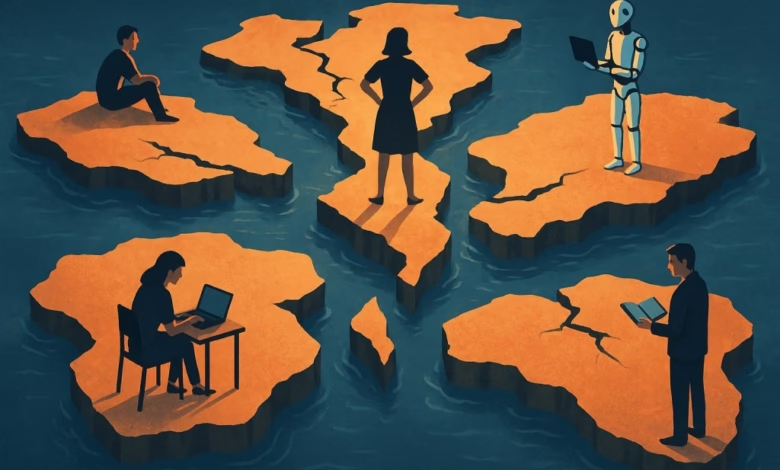AI’s Uncertain Future: Between Utopia and Collapse

▼ Summary
– OpenAI CEO Sam Altman envisions a “gentle singularity” where AI gradually improves human life, making intelligence as accessible as electricity and accelerating scientific progress by 2027.
– Science fiction author William Gibson presents a darker scenario in “The Peripheral,” where societal collapse precedes technological advancement, raising questions about who benefits from progress.
– AI’s impact may lead to a “murky middle” future where some communities thrive while others face job displacement and social instability, as seen in speculative works like “Burn In” and “Elysium.”
– AI risks fracturing the “cognitive commons”—shared knowledge and norms—by personalizing information, eroding trust, and creating individualized realities that undermine democratic discourse.
– Navigating AI’s societal impact requires fostering wisdom, ethical discernment, and new forms of community to adapt to fragmented realities while preserving shared meaning.
The future of artificial intelligence presents two starkly different possibilities: a world of unprecedented abundance or one fractured by societal collapse. OpenAI CEO Sam Altman envisions a “gentle singularity” where AI seamlessly integrates into daily life, boosting productivity and scientific discovery while improving human welfare. Yet this optimistic outlook contrasts sharply with dystopian narratives like William Gibson’s The Peripheral, where technological progress follows societal breakdown. The reality may lie somewhere in between, a future where AI delivers tangible benefits but also deepens inequality and instability.
The murky middle ground suggests AI will reshape economies and social structures in unpredictable ways. Automation could displace white-collar jobs faster than workers can adapt, exacerbating economic divides. Films like Elysium and novels like Burn In illustrate how advanced technologies might benefit only a privileged few, leaving others behind. Even if AI ultimately creates abundance, the transition could be turbulent, testing society’s ability to adapt collectively rather than individually.
Beyond economic disruption, AI threatens the cognitive commons, the shared knowledge and norms that underpin democracy. Personalized algorithms and AI-generated content risk fracturing public discourse, making it harder to agree on basic facts. Historian Yuval Noah Harari warns that AI’s ability to simulate empathy could manipulate beliefs at scale, eroding trust in institutions. If reality becomes increasingly individualized, democratic governance and social cohesion could weaken.
Navigating this fractured landscape will require new approaches to education, governance, and community-building. Rather than resisting fragmentation, societies may need to cultivate resilience by fostering spaces for ethical deliberation and shared purpose. The challenge isn’t just technological but philosophical: How do we preserve meaning in an era where AI reshapes how we think, work, and relate to one another?
The path forward won’t be smooth. While AI holds immense promise, its societal impact depends on how equitably its benefits are distributed and how wisely its risks are managed. The true test may lie not in the technology itself, but in humanity’s ability to steer its course with foresight and compassion.
(Source: VentureBeat)